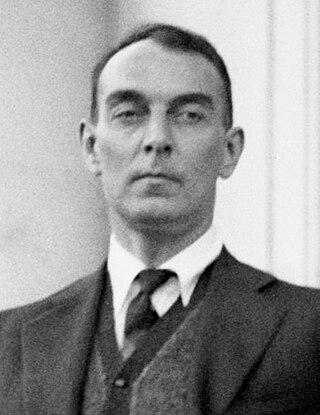
Ringgold Wilmer Lardner was an American sports columnist and short story writer best known for his satirical writings on sports, marriage, and the theatre. His contemporaries Ernest Hemingway, Virginia Woolf, and F. Scott Fitzgerald all professed strong admiration for his writing, and author John O'Hara directly attributed his understanding of dialogue to him.

The Chicago Tribune is a daily newspaper based in Chicago, Illinois, United States, owned by Tribune Publishing. Founded in 1847, and formerly self-styled as the "World's Greatest Newspaper", it remains the most-read daily newspaper in the Chicago metropolitan area and the Great Lakes region. In 2017, it had the sixth-highest circulation of any American newspaper.

City News Bureau of Chicago (CNB), or City Press (1890-2005), was a news bureau that served as one of the first cooperative news agencies in the United States. It was founded in 1890 by the newspapers of Chicago to provide a common source of local and breaking news and also used by them as a training ground for new reporters, described variously as "journalism's school of hard knocks" or "the reporter's boot camp." Hundreds of reporters "graduated" from the City News Bureau into newspaper dailies—both local and national—or other avenues of writing.
The Chicago American was an afternoon newspaper published in Chicago, under various names until its dissolution in 1974.
The Daily Bugle is a fictional New York City tabloid newspaper appearing as a plot element in American comic books published by Marvel Comics. The Daily Bugle is a regular fixture in the Marvel Universe, most prominently in Spider-Man comic titles and their derivative media. The newspaper first appeared in the Human Torch story in Marvel Mystery Comics #18. It returned in Fantastic Four #2. Its offices first shown in The Amazing Spider-Man #1.

The Chicago Sun-Times is a daily newspaper published in Chicago, Illinois, United States. Since 2022, it is the flagship paper of Chicago Public Media, and has the second largest circulation among Chicago newspapers, after the Chicago Tribune. The modern paper grew out of the 1948 merger of the Chicago Sun and the Chicago Daily Times. Journalists at the paper have received eight Pulitzer prizes, mostly in the 1970s; one recipient was film critic Roger Ebert (1975), who worked at the paper from 1967 until his death in 2013. Long owned by the Marshall Field family, since the 1980s ownership of the paper has changed hands numerous times, including twice in the late 2010s.

David Edward Kelley is an American television writer, producer, and former attorney. He has created and/or produced a number of television series including Doogie Howser, M.D., Picket Fences, Chicago Hope, The Practice and its spin-off Boston Legal, Ally McBeal, Boston Public, Goliath, Big Little Lies, and Big Sky. Kelley is one of very few screenwriters to have created shows that have aired on all four top commercial U.S. television networks as well as cable giant HBO.
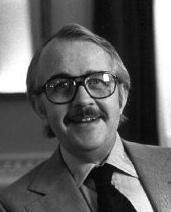
Ernest Ralph Tidyman was an American author and screenwriter, best known for his novels featuring the African-American detective John Shaft. He also co-wrote the screenplay for the film version of Shaft with John D. F. Black in 1971.

A novelization is a derivative novel that adapts the story of a work created for another medium, such as a film, TV series, stage play, comic book, or video game. Film novelizations were particularly popular before the advent of home video, but continue to find commercial success as part of marketing campaigns for major films. They are often written by accomplished writers based on an early draft of the film's script and on a tight deadline.
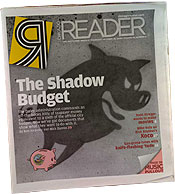
The Chicago Reader, or Reader, is an American alternative weekly newspaper in Chicago, Illinois, noted for its literary style of journalism and coverage of the arts, particularly film and theater. It was founded by a group of friends from Carleton College.
A newsroom is the central place where journalists—reporters, editors, and producers, associate producers, news anchors, news designers, photojournalists, videojournalists, associate editor, residence editor, visual text editor, Desk Head, stringers along with other staffers—work to gather news to be published in a newspaper, an online newspaper or magazine, or broadcast on radio, television, or cable. Some journalism organizations refer to the newsroom as the city room.
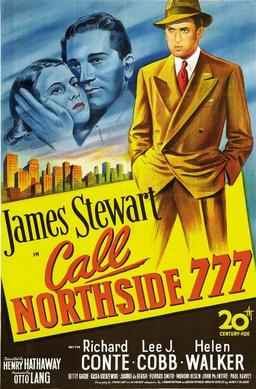
Call Northside 777 is a 1948 reality-based newspaper drama directed by Henry Hathaway. The film parallels the true story of a Chicago reporter who proved that a man jailed for murder was wrongly convicted 11 years before. James Stewart stars as the persistent journalist and Richard Conte plays the imprisoned Frank Wiecek. Wiecek is based on Joseph Majczek, who was wrongly convicted of the murder of a Chicago policeman in 1932, one of the worst years of organized crime during Prohibition.

An advice column is a column in a question and answer format. Typically, a reader writes to the media outlet with a problem in the form of a question, and the media outlet provides an answer or response.

Augustus "Gus" Haynes is a fictional character on the HBO drama The Wire, played by actor Clark Johnson, who is also a director for the series. Haynes is the dedicated and principled editor for The Baltimore Sun city desk.
The Wire is a fictional television drama series produced by the Home Box Office network. The fifth season of the show included a focus on the media and in particular a fictionalized version of The Baltimore Sun. The series introduced many new characters who were professional journalists.

Divorce American Style is a 1967 American film, directed by Bud Yorkin and starring Dick Van Dyke, Debbie Reynolds, Jason Robards, Jean Simmons, and Van Johnson. Norman Lear produced the comedy satire and wrote the script, based on a story by Robert Kaufman. It focuses on a married couple who opt for divorce when counseling fails to help them resolve their various problems, and the problems presented to divorced people by alimony. The title is an homage to Divorce Italian Style (1961).
Paul Vitello is an American journalist who has written for a variety of publications. He wrote an award-winning news column for Newsday from 1982 to 2005. He went on to write for the religion and obituary sections for The New York Times and has taught at Stony Brook University's School of Journalism.
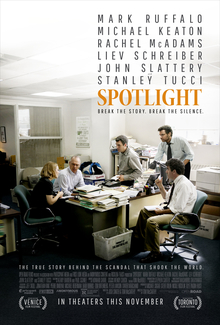
Spotlight is a 2015 American biographical drama film directed by Tom McCarthy and written by McCarthy and Josh Singer. The film follows The Boston Globe's "Spotlight" team, the oldest continuously operating newspaper investigative journalist unit in the United States, and its investigation into cases of widespread and systemic child sex abuse in the Boston area by numerous Catholic priests. Although the plot was original, it is loosely based on a series of stories by the Spotlight team that earned The Globe the 2003 Pulitzer Prize for Public Service. The film features an ensemble cast including Mark Ruffalo, Michael Keaton, Rachel McAdams, John Slattery, and Stanley Tucci, with Brian d'Arcy James, Liev Schreiber, and Billy Crudup in supporting roles.
Lois Jean Wille was a Chicago-based journalist, editor, and author. She won her first of two Pulitzer Prizes in 1963 for a series on local government's failure to provide contraceptive information and services to low-income women. Her stories led to a number of important policy changes in women's healthcare, public housing, and the juvenile court systems.












